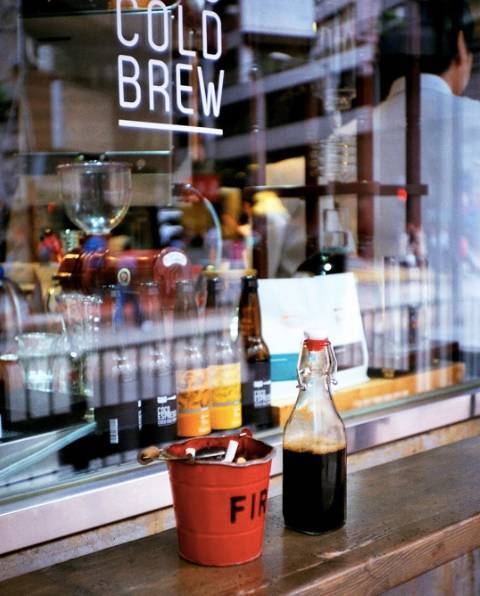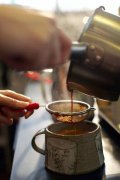Introduction to El Salvador Coffee beans how to describe the Flavor of planting History

For professional baristas, please follow the coffee workshop (Wechat official account cafe_style)
El Salvador's famous Apaneca-Llamatepec region Coffee is supported by international cooperation, with the goal of strengthening the competitiveness of the coffee industry in Central America and the Caribbean, ensuring the value and positioning of its products through awareness of its designated place and origin, as well as providing quality assurance for your home purchase.
An important achievement of El Salvador in recent years is that this mountain area has been certified as the origin of Apaneca Llamatepec mountain coffee. In 2007, Apaneca Llamatepec was designated as a biosphere reserve by the United Nations Educational, Scientific and Cultural Organization (UNESCO). Recently, it was selected as the second most beautiful place in the world in the competition of "eight Wonders of the World" organized by website virtualtourist.com.
Planting variety
100% of the coffee grown in El Salvador is Arabica coffee and grows in mountains and volcanic slopes rich in organic fertile soil. El Salvador produces the world-famous Bourbon variety, which is highly appreciated by coffee connoisseurs all over the world. In particular, the exclusive varieties of Pacamara produced in El Salvador are also in increasing demand in the market for high-quality boutique coffee.
Main varieties:
60% bourbon (Bourbon)
31% Pacas (Pacas)
2% Pacamara (Pacamara)
5% other
Wind El Salvador coffee has many advantages, the color of the treated coffee beans is washed golden brown, this kind of coffee is classified as other categories in the international market, indicating that its taste is very fresh. However, some manufacturers also use microprocessing, that is, the use of common natural sun and "honey treatment" processing to increase the mellowness and sweetness of the taste.
Quality of coffee for export: the quality of coffee export is mainly graded according to altitude and diversity.
Lowlands (C.S.): coffee produced from 400 to 900 meters above sea level
Middle Highland (H.G.): coffee produced from 900m to 1200 m above sea level
S.H.G: coffee bell grass manor La Campanula estate, which is produced above 1200 meters above sea level, is actually an ultra-high altitude manor in Saguo! More than 1650 meters above sea level, the exclusive competition batch of the manor is planted in the environment of 1750 meters high, which is the winning batch of CoE, and Osher is also directly related to the coffee. What people are interested in is actually her Kenyan flavor (VIP who already know her, should be looking forward to it for a long time).
The Lima family only bought this primitive forest in the 1990s. at that time, the bluebells manor was still a wild world, rich in native plants and cool trees, and became a sanctuary for wildlife because of its few people and the adjacent area was a national park. When I first visited in 2008, the manor owner still set out from Santa Ana City with a pistol, and the volcano erupted, which blocked the original path and had to take a long way around, so he brought a gun to protect himself. On the other hand, I was afraid of an emergency. When I saw the familiar 45 pistol and didn't ask any more questions, I was on my way. The climate of the mountain path was changeable. Before I arrived at the manor, it was already foggy and rainy.
Due to the high altitude, cold climate and low fruit yield of coffee trees, most of them are suitable for bourbon species with better wind resistance and Typica, and a few Kenyan SL varieties that are particularly suitable for high altitude and rainy weather, as well as the large Pacamara species that have become popular in Central America in recent years.
This batch of 2014 European bluebells is a mixture of two kinds of Bourbon,Kenya with excellent quality and unique flavor.
The Lima Family family has had practical experience in running coffee gardens in all major coffee producing areas in the country since 1900, and it has been more than a hundred years so far. In 2007, after the first purchase of bluebell grass was introduced into China, we look forward to receiving her samples every year. In 2010, bluebells achieved excellent results in that year, and three years later, due to excellent cup test results, we re-introduced 2014 bluebells!
Campbell Manor is located in the Santa Ana volcanic area, because the volcano will still erupt and is often covered with volcanic ash, which makes the soil of the manor quite fertile. Santa Anna Volcano is very famous and important. Santa Ana must be mentioned when talking about the high-altitude boutique manor in El Salvador. She is a conical layered volcano. The eruption in 2005 frightened many people. That volcanic eruption, even rockfall bigger than trucks, caused mountain casualties. The coffee garden in the de-starched area has been badly hit, but fortunately, the harvest is good every other year, and the quality of the high altitude area is very good. The bluebell manor also belongs to the manor group in this block.
Mount Santa Ana is an important symbol of the Apaneca- Ilamatepec Mountains, whose name is pronounced Apaneca according to its original name. Yilama Tippe
Sa coffee has five major producing areas (Apaneca, Central Belt, Chichontepec, Tecapa)
& Cacahuatique Mountain Range), generally distributed in the alpine slopes or plateau areas covered with volcanic ash at an altitude of 1200 meters, and the coffee harvest and harvest season is from November to April of the following year. As coffee prefers a mild climate, coffee trees are mainly planted in the shade of tall trees (shade grown coffee) in order to avoid excessive temperature and direct sun exposure, affecting the quality of coffee beans.
The coffee beans produced by it belong to Arabica species, mainly from Pacas and Bourbon brands, and belong to big beans with sweet taste and excellent flavor.
The Green Hills Manor in El Salvador, which has been growing coffee for more than 150 years, is currently managed by the Alvarez family, which has been growing coffee in El Salvador for a century.
The coffee growing site of the Green Hills Manor is located on the lush green hills of Santa Ana, in the west of El Salvador, which provides rich volcanic soil and an ideal mild climate, making it an excellent condition for cultivating coffee trees.
The Alvarez family supports the local community by providing free schooling and health check-ups for children aged 5-15.
And the family holds a commitment to natural ecological conservation and environmental protection and does apply it to coffee cultivation.
All the coffee produced by the green hill manor is protected by shade trees, which not only protects the coffee from direct sunlight, but also protects the soil. On the other hand, it also provides habitat for birds and other wild animals.
What is even more commendable about the manor is that it also provides a shelter for stray animals and abandoned animals to have a warm home.
The El Borbollon, owned by the Alvarez family, has been growing coffee in El Salvador for more than 100 years and is now run by a fifth generation of successors. The coffee processing plant comes from two nearby estates, one is LaReforma, which was founded by Rafael Alvarez Lalinde in 1892 and is owned by the same family as the processing plant.
The Bobolong processing plant is now managed by Eduardo Alvarez.
The Bourbon variety is a world-famous shrine.
El Salvador is rich in Bourbon, Pacas and Pacamara varieties of coffee, growing in hills and volcanic slopes, is the most fertile soil for growing coffee, so that Salvadoran coffee has a unique flavor, mellow flavor, moderate acidity, good sweetness, rich aroma and charming tonality.
El Salvador is recognized as the world-famous Bourbon variety, the bourbon variety highly appreciated by coffee experts, with its inherent uniqueness, makes El Salvador one of the most traditional sources of coffee in the world.
Among the countries of origin in Central America
El Salvador can be said to be the smallest country.
Although the output is much less than that of other countries
But the Pacific sea breeze and volcanic environment
However, it provides El Salvador coffee farmers with unique planting advantages and diversified flavor performance.
At present, the winning variety Pacamara in many cup testing competitions was born in El Salvador.
Among the producing areas of El Salvador
It has the advantages of soil quality and planting height.
The Santa Ana volcano is located 2381 meters above sea level west of the capital.
Mount Santa Ana, which is still active, erupted in 2005.
Although it caused heavy economic losses and some casualties to local coffee farmers in that year.
But then these volcanic ash with organic matter provided a very rich source of nutrients for the local soil.
Until now, Santa Ana is still recognized as one of the best producing areas in El Salvador.
Among the Santa Ana producing areas, Saint Elena Manor is one of the few estates at the highest altitude.
The estate is currently run by Mr. Lima and Mr. Don Fernando Lima.
It is currently the third generation of landowners.
Mr. Fernando has more than 30 years of coffee planting experience since he was young.
At present, the main varieties planted in the manor are bourbon and Pacamara.
Mr. Fernando adheres to the principle of maintaining environmental diversity in the concept of manor planting.
As soon as you step into the manor, you can feel the difference from his Salvadoran manor.
The manor maintains a very primitive forest environment.
At the same time, Mr. Fernando also retained a high proportion of old bourbon coffee trees.
Some trees are even more than 15 years old.
For the landowner, these coffee trees are the fruit of painstaking maintenance.
The coffee tree will not be cut down because it is older and has less fruit.
Although these old bourbon trees have less fruit, they can provide a better cup test flavor.
Traditionally, Salvadoran coffee farmers
The exposure of coffee fruits is not handled so carefully.
At the same time, it is also relatively crude in terms of equipment.
But Fernando keeps updating a lot of equipment in the processing plant.
It makes Santa Elena Manor one of the few African scaffolding in El Salvador.
A manor that makes coffee fruits in the sun
Although the use of African scaffolding equipment tends to stretch longer in the sun.
But it can improve the cleanliness and sweetness of coffee.
Meanwhile, Mr. Fernando Fernando
Also started to set up its own washing treatment station 15 years ago.
With its own washing treatment station, the landowner can control the subsequent coffee treatment.
At the same time, more detailed batch experiments of honey treatment can be carried out.
At St. Elena's Manor, Mr. Fernando.
After the coffee red fruit is harvested, it will not be peeled or tanned immediately.
But first put the red fruit in the clean water tank of the treatment plant.
Sit still to improve the sweetness of coffee
Finally, the follow-up processing is carried out.
Although many excellent batches of washed coffee can be found in El Salvador in the past.
But it is often inferior to other countries in terms of sweetness and mellowness.
Santa Elena Manor is one of the few estates in El Salvador with honey treatment and sun exposure experience.
The owner of Fernando Manor is concerned about honey treatment and sun exposure.
Almost reached the point of being critical in every detail of
And these efforts make St. Elena Manor
Won a total of seven C.O.E competitions since 2003
The top 10 in two Central American competitions organized by the Rainforest Conservation Union.
Santa Elena Manor is located west of El Salvador.
Santa Ana Volcano of Santa Ana volcano producing area
Due to volcanoes, the manor soil is very rich in organic matter.
The average elevation of the manor is about 1850 meters and the terrain is steep.
It is one of the highest estates in the area.
At present, the owner of the estate is run by Mr. Don Fernando Lima
Mr. Fernando's idea is to maintain the original traditional planting style of the country as much as possible.
Maintain a wide range of natural agroforestry ecology in the garden except for the necessary pruning and irrigation.
More than 90% of the manors planted bourbon varieties.
At the same time, Fernando
Modern agricultural management techniques are also used to divide the manor into different blocks.
Closely monitor and record the soil quality, fertilization and coffee trees.
In addition to excellent planting, St. Elena Manor also has its own coffee washing facilities.
For farmers with water washing stations, in addition to avoiding price exploitation to outsiders,
The best thing is that the coffee red fruit harvested can be handled more rigorously.
Fernando is very strict in the process of washing treatment.
In addition to regularly recording the temperature and humidity of the day
More attention should be paid to the treatment of coffee and raw beans in the fermentation tank.
This batch is the selected batch in the middle of the harvest season of 2013.
The coffee treated in the middle of harvest has the best quality and flavor.
Flavor description: mango, fermented fruit, pineapple, high sweetness
Active volcanic activity brings mineral-rich volcanic ash to the country, and the soil dominated by volcanic ash contains more minerals and less organic matter, so in order to maintain its geographical position and make up for the lack of organic matter, farmers in the country will use the pulp residue of treated coffee beans or organic matter under coffee trees as fertilizer to make up for the lack of organic matter in the soil, so that the planting of coffee trees can produce coffee beans with harmonious taste. The country's most meaningful initiative is to introduce organic agriculture to the world, cultivating more than 150000 tons of organic coffee every year.
Management
When the coffee beans are ripe into cherry red, they are harvested by hand and carefully treated by water washing and sun drying to retain their unique fruity and sour flavor. There are about 19, 000 coffee producers in El Salvador. According to the geographical location of coffee cultivation, coffee estates are mainly concentrated in six producing areas, covering an area of 179000 hectares.
El Salvador has six major producing areas, all of which are distributed on alpine slopes or plateaus covered with volcanic ash at an altitude of 1200 meters. The coffee harvest and harvest season is from November to April of the following year. As coffee prefers a mild climate, coffee trees are mainly planted in the shade of tall trees (shade grown coffee) in order to avoid excessive temperature and direct sun exposure, affecting the quality of coffee beans.
Farmers in Saudi Arabia will use the pulp residue of the treated coffee beans or the organic matter under the coffee trees as fertilizers to make up for the lack of organic matter in the soil, so that the planting of coffee trees can produce coffee beans with mixed taste. The country's most meaningful initiative is to introduce organic agriculture to the world, cultivating more than 150000 tons of organic coffee every year.
Certificate of origin
Important Notice :
前街咖啡 FrontStreet Coffee has moved to new addredd:
FrontStreet Coffee Address: 315,Donghua East Road,GuangZhou
Tel:020 38364473
- Prev

Cuban Crystal Mountain Coffee Flavor description Information planting History of characteristic Variety producing areas
Professional baristas please follow the coffee workshop (Wechat official account cafe_style) Cuban Crystal Mountain Coffee is a typical island bean, taste clean, delicate, slightly sour but not irritating taste, with a special sweet flavor, very charming. With fertile land, humid climate and abundant Rain Water, Cuba can be called a natural treasure land for coffee cultivation. The suitable natural condition is coffee tree.
- Next

El Salvador Coffee Bean description of advantages and Flavor, introduction of varieties of producing area
Exchange of professional baristas Please pay attention to the coffee workshop (Wechat official account cafe_style) the style of Salvadoran coffee has many advantages, the color of the processed coffee beans presents a washed golden brown, this kind of coffee is classified into other categories in the international market, indicating that its taste is very fresh. However, some manufacturers will also use microprocessing, that is, the use of regular
Related
- Detailed explanation of Jadeite planting Land in Panamanian Jadeite Manor introduction to the grading system of Jadeite competitive bidding, Red bid, Green bid and Rose Summer
- Story of Coffee planting in Brenka region of Costa Rica Stonehenge Manor anaerobic heavy honey treatment of flavor mouth
- What's on the barrel of Blue Mountain Coffee beans?
- Can American coffee also pull flowers? How to use hot American style to pull out a good-looking pattern?
- Can you make a cold extract with coffee beans? What is the right proportion for cold-extracted coffee formula?
- Indonesian PWN Gold Mandrine Coffee Origin Features Flavor How to Chong? Mandolin coffee is American.
- A brief introduction to the flavor characteristics of Brazilian yellow bourbon coffee beans
- What is the effect of different water quality on the flavor of cold-extracted coffee? What kind of water is best for brewing coffee?
- Why do you think of Rose Summer whenever you mention Panamanian coffee?
- Introduction to the characteristics of authentic blue mountain coffee bean producing areas? What is the CIB Coffee Authority in Jamaica?

